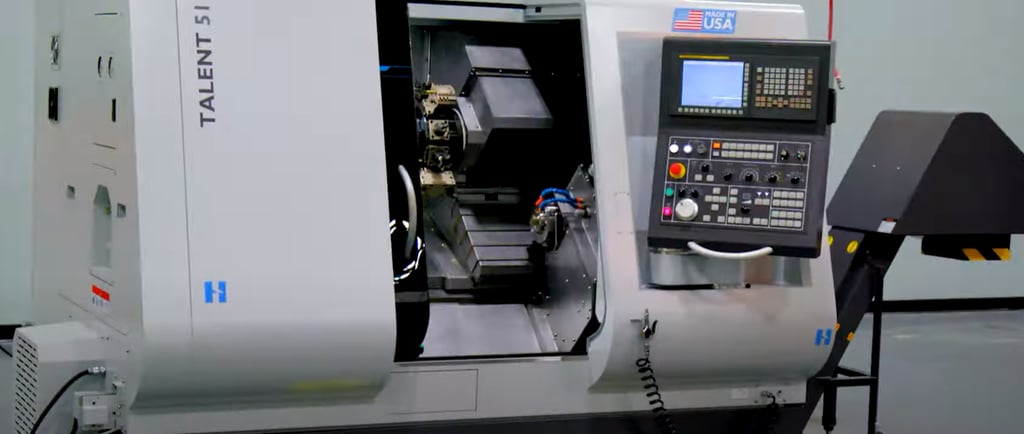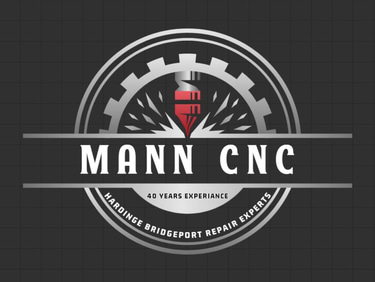5 Warning Signs Your Hardinge Lathe Needs Professional Attention
8/14/20253 min read


Published by Bob Mann, Mann CNC LLC
After 40 years of working on Hardinge lathes and training service technicians, I've seen the same preventable problems occur repeatedly in manufacturing facilities. The key to avoiding costly downtime is recognizing the early warning signs that your equipment needs professional attention.
Here are the top five indicators that your Hardinge lathe requires immediate service:
1. Unusual Vibration or Noise During Operation
What to listen for: Grinding sounds, squealing, or vibrations that weren't present during normal operation.
Why it matters: These symptoms often indicate bearing wear, spindle issues, or problems with the drive system. What starts as a minor noise can quickly escalate into a major failure that requires expensive component replacement.
What I typically find: In my experience, about 80% of "unusual noise" calls are related to worn or brinelled bearings. The remaining cases usually involve inadequate lubrication, contaminated oil or alignment issues that wear out moving parts. If caught early, they can be resolved without replacing major components.
2. Inconsistent Part Tolerances
What to watch for: Parts that were previously meeting specifications are now coming out of tolerance, even when using the same programs and tooling.
The underlying issue: This often points to items mentioned above. In rare instances spindle wear, chuck problems, or temperature fluctuations in the shop can also affect precision, but consistent tolerance issues usually indicate mechanical problems unless temp fluctuations are extreme.
Prevention tip: Keep detailed records of part measurements over time. Gradual tolerance drift is easier to address than sudden failures.
3. Excessive Heat Generation
Warning signs: The spindle, motor, or drive components running hotter than normal, or coolant temperatures that won't stabilize.
Common causes: Bearing deterioration, inadequate lubrication.
Why immediate attention is critical: Heat accelerates wear on all components and can cause thermal expansion that affects accuracy across the entire machine. Components will seize.
4. Erratic Movement or Positioning Problems
Symptoms to recognize: Axes that don't move smoothly, positioning errors, or the machine "hunting" when trying to reach a programmed position.
Technical insight: These issues often stem from problems with ball screws, linear guides, or feedback systems. On Fanuc-controlled Hardinge machines, I frequently find that encoder problems, cables, or loose connections cause these symptoms.
The cost of waiting: Positioning problems typically worsen rapidly and can damage workpieces, tooling, and even the machine itself if left unaddressed.
5. Hydraulic or Pneumatic System Issues
What to monitor: Slow chuck operation, inconsistent clamping pressure, or visible leaks in hydraulic lines.
Why it's crucial: Inconsistent Workholding can lead to scrap parts, damaged tooling, and potential safety hazards. Many operators don't realize that hydraulic system performance directly affects part quality and cycle times.
Professional insight: I've found that regular hydraulic system maintenance can extend chuck life by 300% or more, making it one of the most cost-effective preventive measures.
The Cost of Delayed Maintenance
In my four decades of experience, I've seen too many facilities wait until complete failure before calling for service. A $200 bearing replacement becomes a $5,000 ball screw replacement when ignored. More importantly, the production downtime often costs more than the repair itself.
Preventive Maintenance Recommendations
Weekly: Check fluid levels, inspect for leaks, and monitor for unusual noises. Clean out any chip accumulation.
Annually: Complete system evaluation including electrical connections, software updates, and wear component assessment, comprehensive lubrication service and alignment checks.
When to Call a Professional
If you notice any of these warning signs, don't wait. Modern CNC lathes are complex machines that require specialized knowledge to diagnose and repair properly. Attempting repairs without proper training can often make problems worse and void warranties.
At Mann CNC, we specialize in Hardinge lathes / Bridgeport Mills and understand the unique characteristics of each model. Our on-site service minimizes your downtime and ensures repairs are done correctly the first time.
---
Need expert service for your Hardinge lathe? Contact Mann CNC for fast, reliable repairs by one of the most experienced Hardinge specialists in the industry. Email Service@manncnc.com or visit manncnc.com for more information.
Mann CNC LLC
Service@manncnc.com
MannCNC.com © 2025. All rights reserved.
